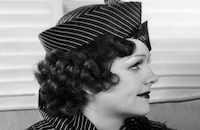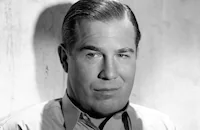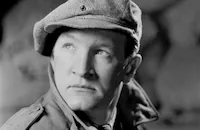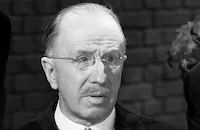Sing and Like It

Brief Synopsis
Cast & Crew
William A. Seiter
Zasu Pitts
Pert Kelton
Edward Everett Horton
Nat Pendleton
Ned Sparks
Film Details
Technical Specs

Synopsis
While breaking into the Union Bank safe, gangster T. Fennimore "Fenny" Sylvester overhears bank employee Annie Snodgrass singing "Your Mother" during an upstairs amateur variety show rehearsal. Moved to tears by the sentimental tune, Fenny decides to put the tin-eared Annie in a Broadway revue and uses numerous threats to coerce theatrical producer Adam Frink into staging it. To publicize the unknown star, the gang executes a phony kidnapping, which makes the front pages of the New York newspapers. However, Fenny's tough girl friend Ruby, herself an aspiring performer, resents the attention and opportunity showered on the homely, untalented Annie and blackmails one of Fenny's men into kidnapping her in earnest before the show's opening. Before Fenny discovers Annie's whereabouts, she is mysteriously kidnapped again and a $15,000 ransom is demanded. Fenny, the king of kidnappers, pays the ransom with chagrin and retrieves Annie in time for the show, whose box office and critical success have been guaranteed by the strong-arm tactics of the gang. Her ambition fulfilled, Annie returns to her faithful, timid boyfriend Oswald, who announces proudly his plans to use the $15,000 ransom he tricked out of Fenny to buy a tomato farm for two.

Director

William A. Seiter
Cast

Zasu Pitts

Pert Kelton

Edward Everett Horton

Nat Pendleton

Ned Sparks

Richard Carle

John M. Qualen
Matt Mchugh
Stanley Fields
William H. Griffith

Roy D'arcy

Joseph Sauers
Dewey Robinson
Phil Tead
Frank Darien
Grace Hayle
George Davis

Arthur Hoyt
Paul Hurst
George Lloyd
Claude Stroud
Clarence Stroud
Billy Gibson
Crew
John L. Cass
Merian C. Cooper
George Crone
Marion Dix
Laird Doyle
Dave Dreyer
Howard J. Green
Al Herman
Aben Kandel
Edward Killy
Nick Musuraca
Walter Plunkett
Van Nest Polglase
Max Steiner
Roy Turk

Film Details
Technical Specs

Articles
Sing and Like It
The prolific William Seiter made a little of everything in his decade-long career (including the Astaire and Rogers musical Roberta, 1935, and a number of Shirley Temple films), but comedy was his specialty, from early silent shorts to TV sitcoms in the 1950s. Sing and Like It draws on the colorful slang of Damon Runyon's underworld tales, with Pendleton growling gangster speak as Fenny and Ned Sparks, the cigar-chewing wise guy of such 1930s comedies as 42nd Street (1932) and Frank Capra's Lady for a Day (1933), translating his comments for civilian audiences. Pendleton made a career playing big lugs, dense thugs, and dim cops, from the slow-witted police officer always behind the witty and worldly Nick Charles in The Thin Man (1934) to a growling Army Sargent opposite Abbott and Costello in Buck Privates (1941). Sing and Like It gave Pendleton a rare leading role and he embraced it.
Erich Von Stroheim cast ZaSu Pitts as the tragic lead of his epic Greed (1925) but to the rest of Hollywood she was a crack comic character actress and her high, fluttery voice and deadpan delivery cinched the deal in the sound era. She starred opposite Thelma Todd in a series of successful comedy shorts in the early thirties and opposite Charles Laughton in Ruggles of Red Gap (1935), and was regularly cast as maids and spinsters and dizzy dames. She's marvelously oblivious as the bank teller with Broadway dreams convinced that her untapped talents have finally been discovered. She sings "Dear Mother" multiple times throughout the film, each delivery earnest and arch and hilariously tortured. Pitt's distinctive voice and delivery inspired actress Mae Questel's rendition of Olive Oyl in the 1930s "Popeye the Sailor" cartoons.
Sing and Like It gave Edward Everett Horton, a master at flustered and fussy and constantly fretting characters (most notably in the Astaire and Rogers classics The Gay Divorcee, 1934, and Top Hat, 1935), the chance to play a more aggressive figure. Frink is a bullying Broadway producer who barks orders and commands the stage, at least until gangster Fenny forces him to use Annie in his latest show "or else!" Or else what is never specified but Frink gets the picture. Pert Kelton, who plays Fenny's streetwise fiancée, made a specialty of floozies and fast women and was the original Alice Kramden opposite Jackie Gleason in the first incarnation The Honeymooners when it was a segment of Gleason's variety show Cavalcade of Stars. She lost the role when she was blacklisted but returned to the screen a decade later as Mrs. Paroo in The Music Man (1962), the lively, red-haired Irish mother to Shirley Jones.
"Treated for gentle burlesque flavor, the picture picks up laughs quickly in the first reel and lands them in fair volume throughout," writes the Variety film critic identified only as Char. "The direction is smooth and the dialog crisp. Miss Pitts proves ideal as the ham actress, which Horton and Pendleton are cinches in the parts for which they are picked." His review ends with one tongue-in-cheek caveat: "One drawback, it may be considered, is the many times which the picture permits Miss Pitts to sing her awful mother ballad."
Sources:
Comic Support: Second Bananas in the Movies, Ronald L. Smith. Citadel Press, 1993.
"Sing and Like It," Char. Variety, April 17, 1934.
"Forgotten Pre-Codes: Sing and Like It," David Cairns. MUBI Notebook, Dec 8, 2011.
AFI Catalog of Feature Films
IMDb
By Sean Axmaker

Sing and Like It
Sing and Like It (1934) -
By Richard Harland Smith
Sing and Like It (1934) -
Quotes
Trivia
Notes
The working title of this film was So You Won't Sing, Eh?, which also was the title of Aben Kandel's unpublished short story from which the script was developed. In July 1934, the Catholic Church of Detroit placed Sing and Like It on its list of "to be boycotted" films.















